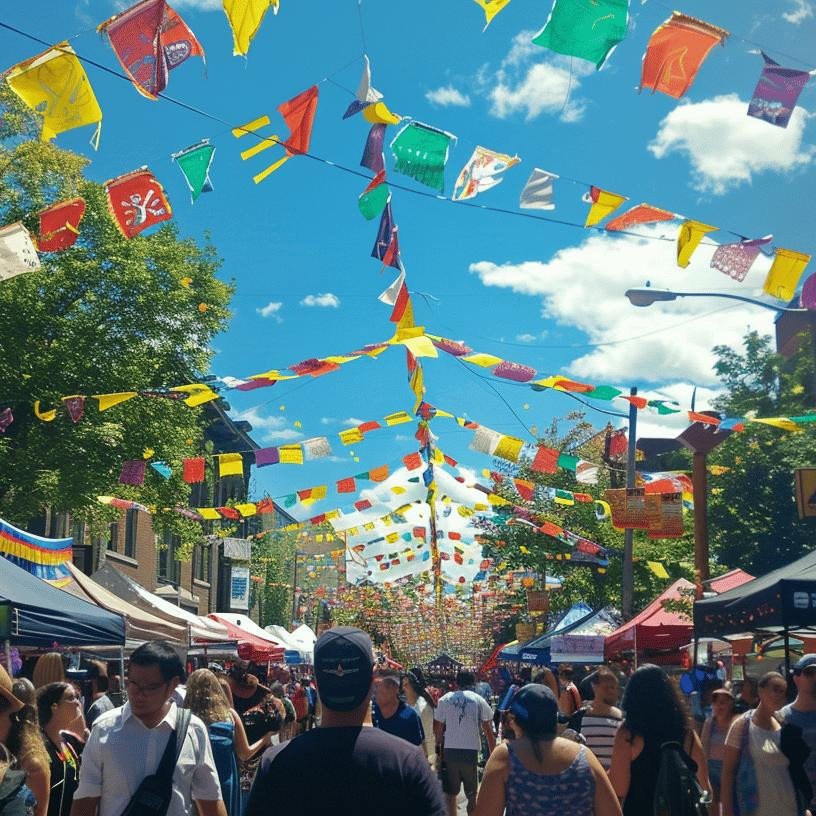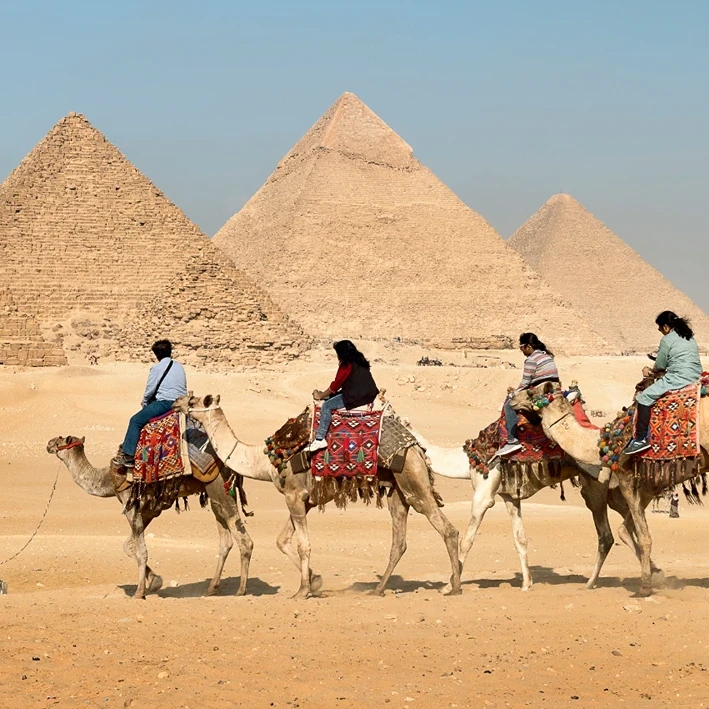Is Egypt calling your adventurous spirit? Embarking on a road trip across this ancient land isn’t just a journey; it’s an odyssey through time. Whether navigating from bustling Cairo to the historic heart of Alexandria or following the scenic route along the Nile from Luxor to Aswan, Egypt offers an array of captivating routes. This guide will take you through the must-see destinations, historical landmarks, and hidden gems along the way, ensuring your road trip is nothing short of unforgettable. Buckle up and let’s explore the best road trips in Egypt!
Table of Contents
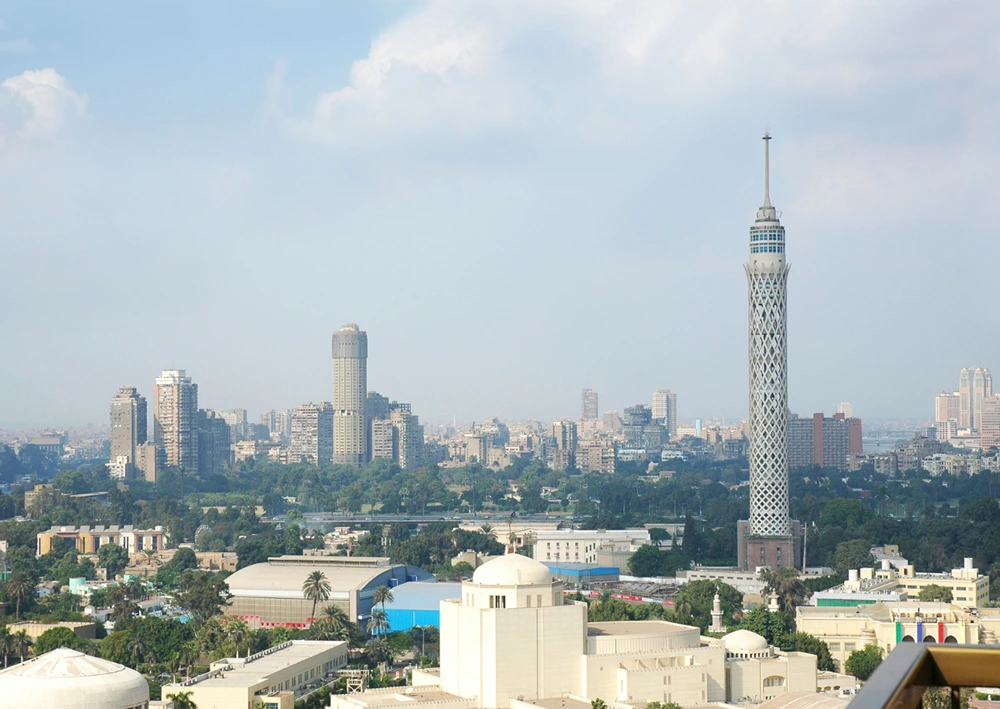
Cairo to Alexandria Road Trip
The Cairo to Alexandria road trip spans approximately 220 km and offers an enticing blend of Egypt’s historical and contemporary sites. Starting from Cairo, the journey takes you through some of the most iconic landmarks in the country. The Great Pyramids of Giza, located just outside Cairo, are an essential first stop, providing a glimpse into ancient Egyptian civilization. As you head north, the Cairo Tower offers panoramic views of the cityscape, bridging the ancient and modern worlds. Continuing the drive, you’ll pass through the lush Nile Delta before reaching Alexandria, a city famed for its Greco-Roman history and Mediterranean charm.
Must-see stops along the route: For a comprehensive guide to the best places to visit in Egypt, you can explore a variety of attractions that highlight the country’s rich history and vibrant culture. From ancient temples to modern museums, knowing the top destinations will help you make the most of your road trip.
- Great Pyramids of Giza
- Cairo Tower
- El-Alamein War Cemetery
- Bibliotheca Alexandrina
- Alexandria National Museum
Upon arriving in Alexandria, visitors will find a variety of accommodations ranging from luxury hotels to charming boutique lodgings. The Four Seasons Hotel Alexandria offers a premium stay with stunning views of the Mediterranean Sea. For dining, the Fish Market Restaurant is renowned for its fresh seafood and picturesque harbor views. Additionally, the city boasts numerous cafes and eateries where you can savor traditional Egyptian dishes as well as international cuisine, ensuring a comfortable and enriching end to your road trip.
Luxor to Aswan Scenic Route
The Luxor to Aswan scenic route spans 240 km along the Nile River, offering travelers a rich tapestry of ancient Egyptian history and mesmerizing landscapes. This route is a must for those looking to immerse themselves in Egypt’s cultural heritage, with numerous archaeological sites and landmarks dotting the journey.
Key historical landmarks along the way include the Valley of the Kings, where the tombs of pharaohs like Tutankhamun are located. The Hatshepsut Temple, a stunning mortuary temple built for one of Egypt’s most famous female pharaohs, is another highlight. As you approach Aswan, the Aswan High Dam, a marvel of modern engineering, provides a stark contrast to the ancient wonders encountered earlier in the trip.
| Landmark | Description |
|---|---|
| Valley of the Kings | Ancient burial site of pharaohs, including Tutankhamun. |
| Hatshepsut Temple | Mortuary temple dedicated to Queen Hatshepsut. |
| Edfu Temple | Well-preserved temple dedicated to the falcon god Horus. |
| Aswan High Dam | Modern dam providing irrigation and electricity, creating Lake Nasser. |
For a successful road trip, ensure your vehicle is in good condition and carry plenty of water and snacks, as services can be sparse between towns. A GPS or detailed map is essential for navigating the route. Travel during the cooler months from October to April to avoid the extreme heat and make the most of your journey through one of Egypt’s most historically rich regions.
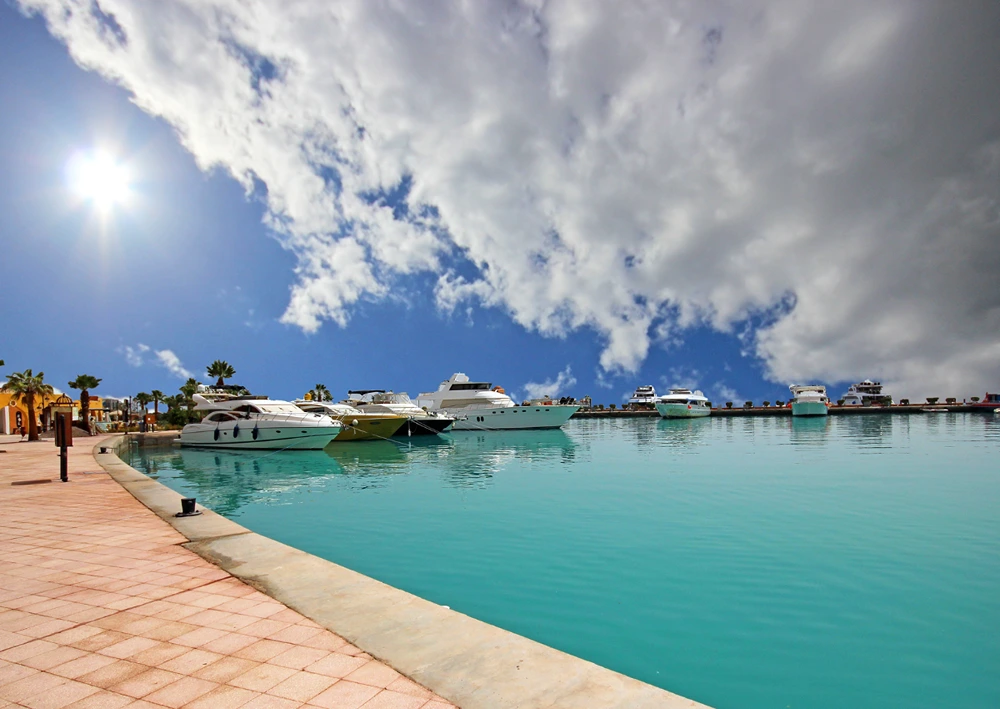
Red Sea Coastal Road Trip
The Red Sea Coastal Road Trip spans approximately 300 km from Hurghada to Marsa Alam, offering breathtaking coastal views and abundant opportunities for water-based activities. This route is perfect for those looking to combine scenic drives with beach destinations and underwater adventures.
Key attractions along the Red Sea Coastal Road include Giftun Island, known for its pristine beaches and vibrant marine life. Wadi El Gemal National Park is another highlight, featuring diverse ecosystems ranging from desert landscapes to coral reefs. Along the way, travelers can also visit the El Quseir Fortress, a historical site offering a glimpse into Egypt’s past while providing stunning sea views.
Popular diving and snorkeling spots:
- Giftun Island
- Abu Dabbab Bay
- Elphinstone Reef
- Dolphin House (Sha’ab Samadai)
- Marsa Mubarak
Accommodation options along this route are plentiful, catering to various budgets and preferences. If you are traveling with kids in Egypt, there are numerous family-friendly resorts and activities that will keep your little ones entertained. From snorkeling in the Red Sea to exploring historical sites, Egypt offers a wealth of experiences that are both educational and fun for children. Hurghada offers numerous beachfront resorts such as the Oberoi Sahl Hasheesh, known for its luxury and excellent service. Marsa Alam also boasts several high-end resorts like the Hilton Marsa Alam Nubian Resort. For those seeking a more budget-friendly option, El Quseir provides several mid-range hotels that offer comfortable stays with easy access to the beach and local attractions.
Cairo to Siwa Oasis Road Trip
The Cairo to Siwa Oasis road trip spans approximately 750 km, offering an adventurous journey through Egypt’s Western Desert. Departing from Cairo, the route takes you past the expansive Great Sand Sea, a vast desert landscape characterized by its towering dunes and dramatic vistas. As you approach Siwa, you’ll encounter Cleopatra’s Bath, a natural spring reputed for its refreshingly cool waters. The journey culminates at the Temple of the Oracle, an ancient site steeped in historical significance, where Alexander the Great once sought guidance.
Must-visit spots in Siwa Oasis:
- Great Sand Sea
- Cleopatra’s Bath
- Temple of the Oracle
- Mountain of the Dead
Traveling through the desert requires meticulous preparation. Ensure that your vehicle is well-maintained and equipped with spare tires and extra fuel. Carry ample water and provisions, as services can be sparse along the route. A GPS device or detailed map is indispensable for navigation. It’s also advisable to inform someone of your travel plans and expected arrival time in Siwa, as cellular reception can be unreliable. Traveling in the cooler months, from October to April, will make the journey more comfortable and reduce the risk of heat-related issues.
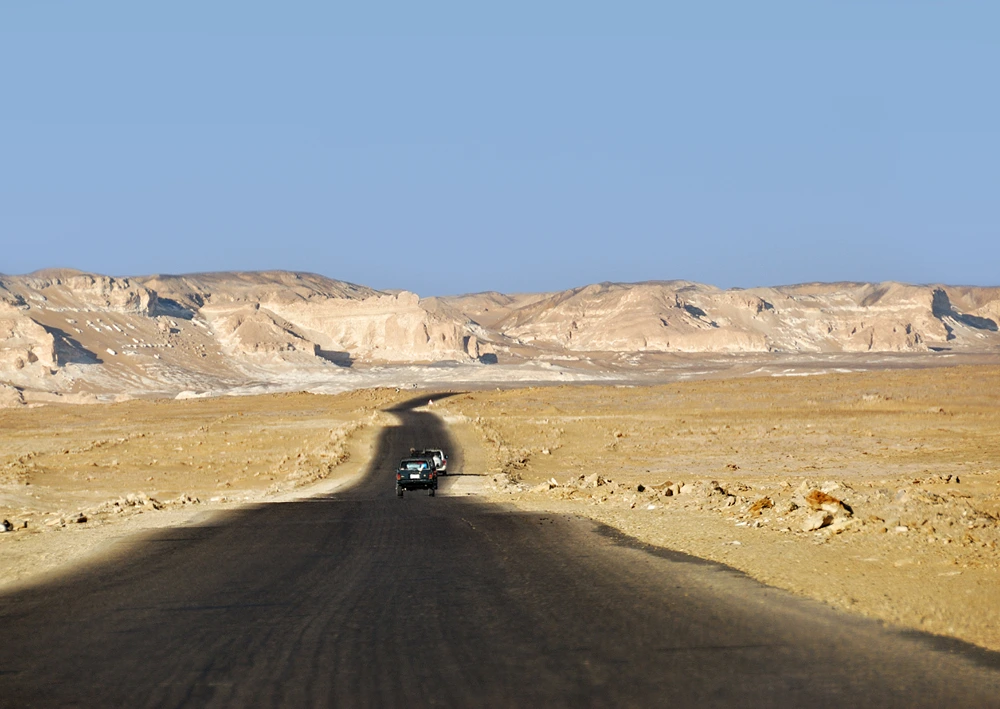
Practical Tips for Road Trips in Egypt
Preparation is key for a successful road trip in Egypt. Ensure your vehicle is well-maintained, with a thorough check-up of the engine, brakes, and tires before departure. Carry essential items such as a spare tire, jack, and basic tools for minor repairs. It’s crucial to have plenty of water and non-perishable snacks, especially for long stretches between towns. A GPS device or a detailed map is indispensable for navigation, as some areas may have limited cellular reception. Additionally, familiarize yourself with local driving laws and customs to avoid any legal issues or misunderstandings on the road.
Driving tips and safety advice:
- Always carry a spare tire and basic repair tools
- Keep an ample supply of water and snacks
- Use a reliable GPS device or detailed map
- Familiarize yourself with local driving regulations
- Avoid driving at night, especially in rural areas
- Regularly check travel advisories for safety updates
Utilizing Xpat Journeys for your planning can provide valuable insights and support. Additionally, understanding the money and costs for Egypt is crucial for budgeting your trip. From accommodation and dining to entrance fees for historical sites, having a clear idea of expenses will help you manage your finances better and ensure a stress-free travel experience. Their expertise in the region ensures you receive up-to-date information on road conditions, recommended routes, and cultural tips. This can significantly enhance your travel experience, allowing you to focus on enjoying the journey rather than worrying about logistics.
Best Time for a Road Trip in Egypt
The best time for a road trip in Egypt is from October to April when the weather is cooler and more comfortable for travel and sightseeing. For more detailed information on the best time to travel to Egypt, you can explore various aspects of the climate and seasonal events that make these months ideal for visiting. Understanding the weather patterns can help you plan your trip more effectively, ensuring you experience Egypt at its finest. During these months, daytime temperatures are generally pleasant, ranging from the mid-70s to mid-80s Fahrenheit, making it ideal for exploring Egypt’s diverse landscapes and historical sites. The cooler weather also reduces the risk of heat exhaustion and allows for more enjoyable outdoor activities. Conversely, the summer months from May to September can be extremely hot, with temperatures often exceeding 100 degrees Fahrenheit, which can make travel challenging and uncomfortable.
Best months for road trips and reasons:
- October: Mild temperatures, fewer tourists
- February: Pleasant weather, ideal for sightseeing
- April: Comfortable climate, vibrant local festivals
Cultural Insights for Road Tripping in Egypt
Understanding and respecting local customs and traditions can significantly enhance your travel experience in Egypt. Egyptians value modesty, especially in rural areas and religious sites. Dressing conservatively by covering shoulders and knees can help you blend in and show respect. Public displays of affection are generally frowned upon, and it’s best to greet people with a handshake or a polite nod. When visiting mosques or other religious sites, removing your shoes and maintaining a respectful demeanor are vital. Egyptians are known for their hospitality, and it’s common to be offered tea or coffee as a gesture of goodwill.
Specific tips for respecting local culture:
- Dress modestly, covering shoulders and knees
- Avoid public displays of affection
- Remove shoes when entering religious sites
- Greet locals with a handshake or nod
- Accept hospitality, such as tea or coffee, graciously
Cultural awareness not only enriches your travel experience but also fosters positive interactions with locals. It opens doors to unique experiences and hidden treasures that you might otherwise miss. By showing respect and understanding, you are more likely to receive warm welcomes and insightful conversations, making your road trip through Egypt both memorable and enriching.
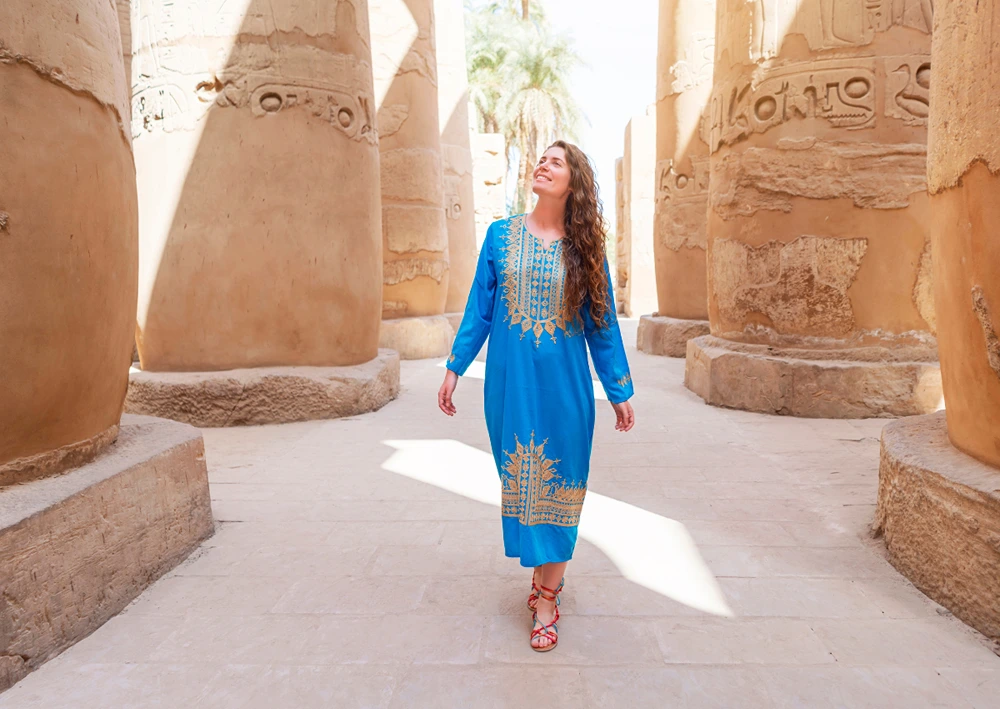
Final Words
Embarking on road trips in Egypt offers travelers an enriching experience of the country’s historical landmarks, scenic routes, and cultural insights. Whether driving from Cairo to Alexandria or exploring the scenic Luxor to Aswan route, each journey promises a blend of discovery and adventure.
Practical tips and careful preparation are essential for a smooth trip. Understanding local customs can greatly enhance your travel experience.
The best road trips in Egypt provide not only unforgettable sights but also a deeper connection to the region’s rich history and vibrant culture.
FAQ
Hazel Wall is a passionate traveler, writer, and explorer dedicated to sharing her experiences and insights with fellow adventurers. With a background in journalism and a deep love for discovering new cultures, Hazel has journeyed across continents, immersing herself in diverse landscapes and traditions.



